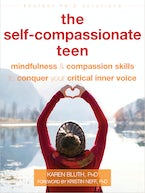By Karen Bluth, author of The Self-Compassionate Teen
Now, more than ever, teens need self-compassion.
Dealing with the fallout of COVID-19 is hard on everyone. Particularly for teens. It’s the job of teens to find their own way, to separate from their parents, to figure out who they are and how they want to be in the world. The psychologist Erik Erikson defined the teenage years as the age of identity formation—a time when teens experiment with different styles, presenting themselves in different ways to those around them. As a teen, I remember spending hours in the days before the first day of school trying to figure out just the right outfit, hairstyle, and makeup I’d wear on that first day because it was so important for other kids to know just who I was.
These days, teens don’t even know what a day in school might look like. If in school, will they be able to interact with their peers? Will there be plexiglass dividers between them and the other students in the classroom? Will they be able to chat with others at lunch the way they have in the past? Will there be sports events, school plays, band class or debate club? How do you have chorus class wearing a mask?
Working through the challenges life presents to us is where self-compassion does its magic. Self-compassion teaches us that we can be our own best friend, we can be there for ourselves when we’re sad or hurt or angry, and that we don’t really need others to feel worthy or whole. Hanging out and sharing experiences with friends is great, but when you can’t do that, you can still be okay. In a nutshell, self-compassion helps us build resilience skills to manage tough moments in our lives—like this strange time of COVID.
In numerous research studies, self-compassion has been linked with less depression, anxiety, and stress (Marsh et al., 2017). So, how can you, as an adult, help your teen be more self-compassionate?
Here are a few tips:
-
You can model being self-compassionate. Our kids—even when they’re teens—learn from us. When you burn the rice, if you exclaim, “I’m such an idiot! How can I do such a dumb thing!” your teen will pick up on this and will think, “I guess if I make a mistake, I’m an idiot also.” Self-compassion reminds us that it’s human to make mistakes. And it does this in the very moment we make the mistake. So, you can skip the nasty verbal self-flagellation. Second, self-compassion research has found that when we say kind words to ourselves, we are less likely to be depressed and anxious. So instead of the self-recrimination, you can say, “Oh geez, I burned the rice. That’s disappointing. It’s hard managing kids’ homework, a phone call, and cooking at the same time. And after a hard day at work! Maybe next time I won’t answer the phone, and just focus on the rice.” Or maybe simply saying, “Burned rice—not the end of the world!” The point is, when your teen sees you treating yourself with kindness, they’ll know that they can also do it.
-
Validate your teen’s feelings. When they say, “You don’t know what it’s like to miss out on all my high school events! I’ll never get them back!” respond with “I know you were looking forward to them. I’m so sorry you’re going to be missing them. I wish we could do something about it.” Not only will they feel heard, but you’ll be presenting an important life lesson—sometimes we can’t “fix” circumstances, as much as we’d like to. Sometimes life presents difficult situations, and the best we can do is learn how to manage them with the least amount of angst.
-
Once you validate their feelings, you can help them find a way to soothe themselves. Suggest watching a movie together, going for a walk, or kicking around a soccer ball. Maybe you can put on some fun music and dance around the kitchen.
-
If they’re open to meditation practice, you can suggest a short practice:
-
Music meditation – Teens can stretch out on a couch or bed, put on headphones, and listen to relaxing instrumental music—and really pay attention to the music. Each time their attention wanders away from the music, they can guide their attention back to the sounds of the music.
-
Movement – If they’re getting antsy or bored from being around the house, they can take a few minutes to notice how their body feels and move their body however it feels like it needs to be moved. Stretching, doing a few yoga moves, or maybe running around the house can make them feel less irritable.
-
What words would I say to a friend? Teens can think of a good friend who was struggling similarly with the COVID experience, and what they might say to them. Something simple like “Know what? This sucks. And we can’t do anything about it, so let’s just make the best of it.” And then they can say the same words to themselves, repeating them silently to themselves.
-
Sensory experience – Teens can immerse themselves by lying on their backs looking at clouds, listening to birds, or simply feeling the comfort of being curled up in their beds. Have them spend a few minutes here, letting thoughts drift away and focusing on the sensory experience—what their body actually feels like in the moment.
Although dealing with COVID-19 is challenging, it’s also an opportunity to learn resilience skills that can support you and your teen throughout your lifetimes. And what better gift could you give your child?
Karen Bluth, PhD, earned her doctoral degree in child and family studies at the University of Tennessee. She is currently research faculty in department of psychiatry, and a research fellow at the Frank Porter Graham Child Development Institute. Her research focuses on the roles that mindfulness and self-compassion play in promoting well-being in teens.



 2024 Peace Playbook: 3 Tactics to Avoid Clashes with Your Partner
2024 Peace Playbook: 3 Tactics to Avoid Clashes with Your Partner